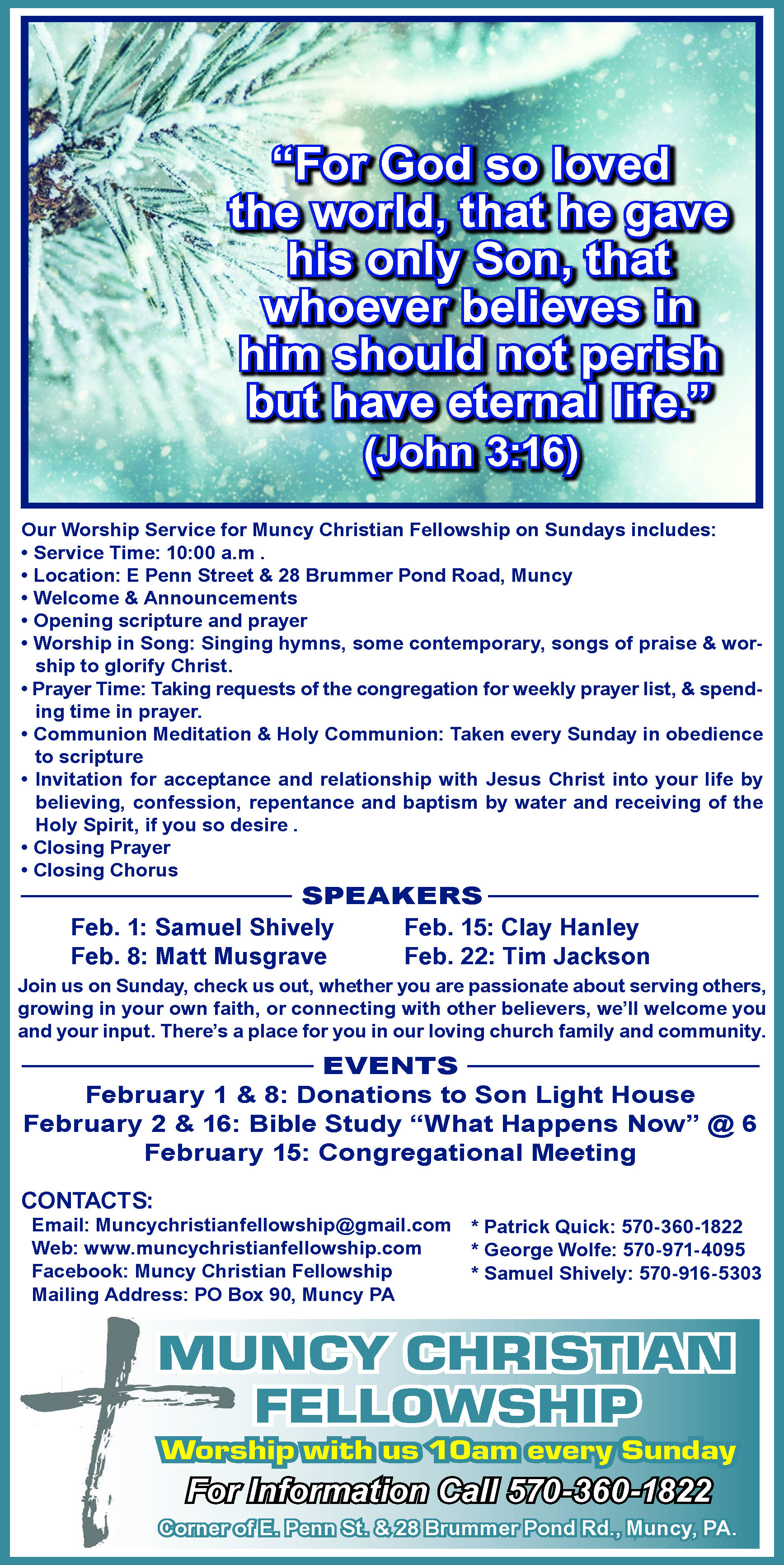Eighty years ago, in 1941, three weeks before Christmas, the United States was “suddenly and deliberately attacked” in a sneak attack by the Japanese at Pearl Harbor, plunging us into an unwanted war. What was supposed to be another routine Christmas holiday season was changed utterly by this. People in the Williamsport area and then across the rest of the country tried to do their best to carry on as normally as they could despite these dramatic new circumstances.
1941 was a memorable and historical year; besides the attack on Pearl Harbor, the British sunk the giant battleship “Bismark” in May. In August, President Franklin Roosevelt and British Prime Minister Winston Churchill proclaimed the “Atlantic Charter” in a meeting off Newfoundland. The Germans invaded the Soviet Union in June. The Willys company introduced the Jeep in June.
In popular culture, Duke Ellington recorded “Take the A Train,” Glenn Miller recorded “Chattanooga Choo-Choo,” and the Andrews Sisters, “Boogie Woogie Bugle Boy of Company B” that year.
At the movies that year, “Citizen Kane,” considered by many film critics the “greatest film ever made,” is released. Other classic films released that year included “How Green Was My Valley,” “Sergeant York,” and “The Maltese Falcon.”
In sports, the “Brown Bomber,” Joe Louis, reigned as heavyweight boxing champion. In baseball, it was a year of distinction. The Red Sox’s Ted Williams hit .406, and is still the last major league batter to reach the magic .400 mark. 1941 was also the year of the Yankee’s Joe Dimaggio’s 56-game hitting streak, a mark which many believe may never be matched or broken. The Yankees defeated the Brooklyn Dodgers in the World Series.
In football, the Minnesota “Golden Gophers” won the college football championship. Bruce Smith earned the Heisman trophy, and the Chicago Bears defeated the New York Giants to win the NFL championship. The first pick in that year’s NFL college draft was Bill Dudley, who was picked by the Steelers.
Since our involvement in the war had just started, wartime shortages had not started to set in yet, though resources for the fighting of war were beginning to be gathered and would start soon to affect the consumer market. My late father, who was then seven years old, found this out the hard way. On Friday, December 5, my grandparents placed an order for a brand-new bicycle for him for Christmas. On Monday, December 8, the day after the Pearl Harbor attack, the store where the bike order had been placed canceled it because of the wartime emergency.
Locally, during that memorable Christmastide, despite the outbreak of war, it was a brisk Christmas shopping season that year. According to the “Gazette and Bulletin,” “the spirit of giving and the holiday atmosphere in the downtown district seemed to be good antidotes for those who were unable to give thought to anything but the battle in the Pacific.”
For local grocery consumers, it was noted that A&P had pork loins for 15 cents per pound, chuck roast for 22 cents a pound, butter was on sale, two pounds for 73 cents, Marvel Breads 1 1/2 pound loaf sold for 15 cents, fresh milk was 13 cents a quart, a dozen eggs sold for 41 cents, and a 24-pound bag of flour was 79 cents.
Neyhart’s had sleds for $1.29 and up, metal scooters for $2.94.
At L.L. Stearns, men’s ties were on sale for $1 each; a blouse could be had for $3.60. All purchases of $1 or more would be gift wrapped without charge, handmade handkerchiefs were 39 cents each, Philco radio-phonographs were selling for $109, in toys, a shooting battleship was 98 cents, a large dollhouse was $5.50.
The Williamsport Sun began on December 20 a “World At War” map to be presented regularly that in its words, “the map is of such importance that readers are urged to cut it out and keep it handy for reference in following the course of the war.”
In mid-December, it was announced that The West Branch Firemen’s Association had a special course in civilian defense practices, which was made available to the public.
A meeting shortly before Christmas was held by the organizations of area drug stores to prepare for first aid centers.
The James V. Brown Library was named a clearinghouse for all defense-related literature from the federal, state, and local governments. It would be housed in the Reference Room.
Large crowds estimated at 2,500 attended the third annual Community Christmas Sing held on the evening of December 22 outside the Sun-Gazette Building at Hepburn and West Fourth streets, sponsored by WRAK and the Sun-Gazette Company.
The Rialto Theatre showed “Kathleen,” starring Shirley Temple, Larraine Day, and Herbert Marshall. “Birth of the Blues” with Bing Crosby, Brian Donlevy, Rochester, and J. Carroll Naish at the Capitol Theatre, The Park Theatre was showing “Wild Geese Calling,” starring Henry Fonda and Joan Bennett. The Karlton featured “Great Guns,” starring Laurel and Hardy.
A three-inch rainfall on December 23 caused flooding along Lycoming and Loyalsock Creeks. Some roads were blocked, and several railroad bridges were threatened but held.
High Street, in the area of the Lycoming Division of the Aviation Manufacturing Corporation, was ordered closed by Mayor Leo C. Williamson as a precaution against possible sabotage.
The Salvation Army distributed food baskets to 500 needy families in the county.



